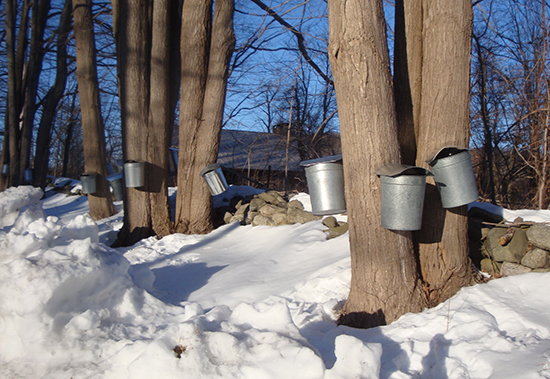by David St.-Lascaux

Tapped sugar maples, Hubbard Lodge, Clarence Fahnestock State Park, Cold Spring.
Saturday, March 8, 2014
EVERYWHERE WE TURN, we discover delightful examples of sustainable utilization of the Hudson Valley’s natural resources. Looking for a place to take a short hike in the depths of this icy winter, we visited Hubbard Lodge at the Clarence Fahnestock State Park, just down the highway from the Library (our home) on Route 9 in Cold Spring. As we drove in, we were treated to the sight of dozens of sap buckets on the sugar maples lining the driveway. The tap holes are about 9 mm; the yield is about 1/10, sap to syrup.
Given the chilly temperature, our walk was brief. After taking in the butterfly and bird displays behind the lodge, we proceeded to the confluence of Clove and Bull Creeks, enjoying a winter panorama not seen by most that we will be able to put in context on future hikes in coming seasons. I’m looking forward to seeing bluebirds – this species the New York State bird – this spring and summer; in the meantime, flittering black-capped chickadees bring smiles and memories of riverine family winter walks along the Raccoon River in faraway Des Moines.
My fiancée, the Agrarian Librarian, remarked the calls of songbirds, which I no longer hear, having lost my high frequency hearing decades ago. Learning birdcalls from my mother was a joy of youth; the vicarious knowledge that the atmosphere is still graced by birdsong is dimly consoling; I take the rapt “Did you hear that?” on faith.
I do wish I had ever heard the ovenbird, whose call my darling says is adorable; I discovered this bird, which I’ve yet to see, when reading Robert Frost’s sonnet-poem, which I had to rewrite because, antithetically to its subject, it was gratuitously dour. My version goes like this:
The Ovenbird
There is a singer everyone has heard:
a loud, mid-summer and a mid-wood bird,
who makes the tree trunks sound again.
He says that leaves are old and that for flowers
mid-summer misses spring-time’s when.
He says the early petal-fall is past;
he says the kids are kicking in the dell;
he says the weeds are waving in the wind
(he says there’s so much more to tell).
The bird would be as other birds
but that he knows which song is his to sing.
The question that he frames in all but words
is what to make of such a little thing.
IF YOU HAVE THE LUCKY GIFT of sensitive ears, you can easily learn the languages of birds. Like the names of stars and constellations, the songbirds and their songs are distinctive and readily absorbed. There are so many things to learn and love, if one can hear, and listens.
* * *
March 14: Zephyr and the Icicle
Text and photo copyright © 2014

